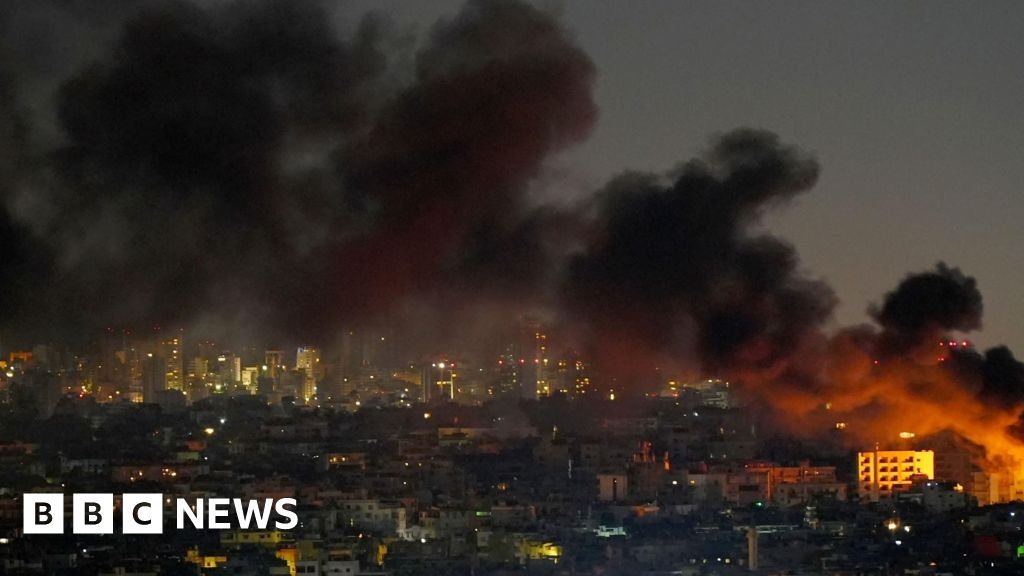Israel carried out further airstrikes in Beirut and southern Lebanon, including on branches of banks linked to Hezbollah.
Explosions were heard in the Dahieh district of southern Beirut, an area controlled by Hezbollah, as well as in the Bekaa Valley and southern Lebanon. It is unclear whether there were any casualties.
Earlier, the Israeli army warned that it planned to carry out attacks throughout the night against people living in more than 20 areas in Lebanon, including 14 areas in the capital Beirut.
The Israel Defense Forces (IDF) said it would also target banks and other financial infrastructure supporting Hezbollah.
IDF spokesman Maj. Gen. Daniel Hagari warned in a statement Sunday night that “those in the vicinity of locations that were financing Hezbollah’s terrorist activities must leave the locations immediately.”
“We will strike multiple targets in the next few hours, and additional targets during the night,” he said.
The Israeli spokesperson added: “We will reveal in the coming days how Iran is financing Hezbollah’s terrorist activities, using private institutions, organizations and NGOs that act as fronts for terrorism.” .
Lebanese state news agency NNA reported a strike against branches of Al-Qaad Al-Hassan Banking Association, including the eastern Bekaa Valley.
It also reported a strike at the bank’s branch near Beirut's Rafic Hariri International Airport. Footage showed smoke billowing up after the explosion near the airport.
The bank has more than 30 branches across Lebanon, including two in central Beirut.
Israel accuses the association of funneling Iranian money to it to buy and store weapons and pay salaries for its members. The agency has been under U.S. sanctions since 2007, and U.S. officials accuse it of being a front for Hezbollah to control its financial activities.
It also provides services to civilians in some parts of the country where the group has strong support.
Meanwhile, Hezbollah announced on Sunday that it had fired more rockets into Israel, targeting military bases. It also said it had opened fire on Israeli forces on the ground in southern Lebanon.
On Sunday night, the Israel Defense Forces announced that dozens of projectiles (usually meant rockets) had been fired into northern Israel in the past 24 hours.
It also said that its warplanes carried out “intelligence-based attacks on the headquarters of Hezbollah’s intelligence headquarters and an underground weapons factory in Beirut.”
It said measures had been taken to “reduce the possibility of civilian casualties”.
Israel has been accused by Hezbollah and Lebanese officials of targeting civilians, which Israel denies.
On Sunday, the UN Interim Force in Lebanon (Unifil) accused the IDF of deliberately destroying a watchtower and border fence at a UN stronghold in the southern Lebanese town of Marwahin, on the border with Israel. This follows similar incidents in recent weeks.
“We reiterate that violating the UN position and causing damage to UN assets is a serious violation of international law and Security Council resolution 1701,” UNIFIL said in a statement.
In a separate development, the Lebanese army said three soldiers were killed in an Israeli airstrike on a military vehicle in Nabatiyeh, southern Lebanon.
Israel has not yet commented on the two reported incidents.
The Lebanese army has not historically been involved in cross-border clashes between Israel and Hezbollah, but many soldiers have been killed in Israeli attacks since fighting escalated last month.
Lebanon’s powerful armed group Hezbollah said it was firing on Israeli positions in solidarity with Hamas in the Gaza Strip.
Both Hezbollah and Hamas are supported by Iran.
Lebanese authorities estimate that more than 2,400 people have been killed in the country over the past year. Israel announced that 59 people were killed in northern Israel and the occupied Golan Heights during the same period.

